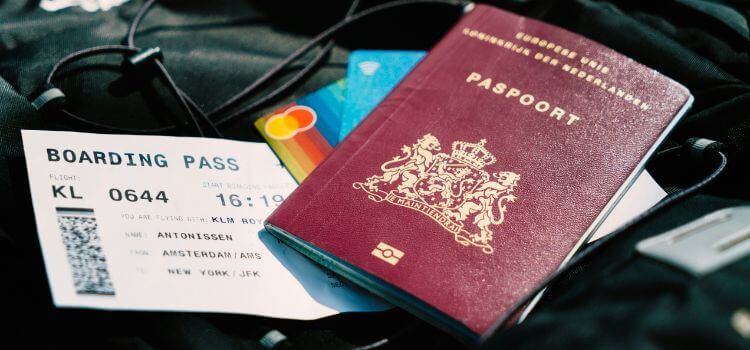As an Amazon Associate, I earn from qualifying purchases

A passport is essential for many people who want to travel internationally. However, not everyone can receive a passport, especially those with certain criminal convictions. It’s critical to understand which felonies can disqualify you from getting a passport to avoid any complications or issues during the application process. In this post, we will outline the felonies that can affect your eligibility for a passport and provide guidance on how to navigate this situation.
Murder
It is a serious felony that can disqualify you from getting a passport. If you have been convicted of murder, you will likely be denied a visa due to the severe nature of the crime. Additionally, if you are currently serving a sentence for murder or are on probation or parole related to a murder conviction, you will also be ineligible for a passport. It’s important to note that even if you have completed your sentence for murder, there may still be restrictions on obtaining a visa. Hence, it’s crucial to research and understand your situation’s laws and regulations. If you have a murder conviction on your record and are unsure about your eligibility for a passport, it’s best to consult with a legal professional for guidance.
Drug trafficking
It is another felony that can disqualify you from getting a passport. If you have been convicted of drug trafficking, you will likely be denied a passport due to the severe nature of the crime. This is because drug trafficking is considered a threat to national security, and individuals involved in this activity are not considered eligible for a passport.
Additionally, suppose you are currently serving a sentence for drug trafficking or are on probation or parole related to a drug trafficking conviction. In that case, you will also be ineligible for a passport. It’s essential to be aware of the consequences of drug trafficking on your ability to obtain a passport, and it’s crucial to seek legal advice if you have a drug trafficking conviction on your record. It’s critical to abide by the rules and laws about passport eligibility; if you have any concerns about it, you should speak with an attorney.
Human trafficking
It is illegal to use human beings for forced labor or commercial sex. In addition to being a heinous crime, human trafficking can also disqualify individuals from obtaining a passport. If you have been involved in human trafficking, you will likely be denied a visa due to the severe nature of the crime and the threat it poses to national security. It’s important to understand that engaging in human trafficking has severe legal consequences and can significantly impact your ability to travel internationally. If you have any concerns or questions about your eligibility for a passport due to a criminal conviction, it’s best to seek legal advice to understand your rights and options.
Sexual exploitation of children
A serious crime can have long-lasting and devastating effects on the victims. Those who have been convicted of sexual exploitation of children will be disqualified from obtaining a passport. The U.S. Department of State takes this crime very seriously and will not issue a visa to individuals with a conviction related to the sexual exploitation of children.
If you have participated in the sexual exploitation of minors, you must understand the legal repercussions of this offense and obtain legal counsel. Additionally, individuals who are currently serving a sentence for sexual exploitation of children or are on probation or parole related to a sexual exploitation conviction will also be ineligible for a passport. It’s essential to seek legal advice and to understand the consequences of sexual exploitation on your ability to obtain a visa. If you have any concerns about your eligibility for a passport due to a criminal conviction, it’s best to consult a legal professional for guidance.
Terrorism

It is a severe global problem that affects communities all around the world. Understanding the potential legal repercussions of terrorism-related actions and how they may impact your application for a passport. Those convicted of specific terrorism-related charges will not be eligible to receive a visa. These offenses include participating in terrorist activities, supporting terrorist groups, and carrying out violent acts to threaten or influence the general public. The United States Department of State takes these offenses seriously and will not grant a passport to anyone convicted of terrorism-related crimes.
Additionally, individuals who are currently serving a sentence for terrorism-related crimes or are on probation or parole related to a terrorism conviction will also be ineligible for a passport. You must acquire legal counsel and comprehend the implications of engaging in activities related to terrorism on your eligibility for a visa. It is best to seek legal advice from an expert if you are unsure if a criminal record will prevent you from being eligible for a passport.
Treason
It is a severe offense with harsh penalties, such as being unable to get a passport. If an individual has been convicted of treason, they will not be eligible to receive a passport. Additionally, individuals who have committed felonies related to terrorism, such as providing support to terrorist organizations or engaging in terrorist activities, will also be disqualified from getting a passport. The U.S. Department of State takes these crimes very seriously. It has strict guidelines to ensure that individuals with terrorism-related convictions do not have access to a passport. If you are still determining if you qualify for a passport, it is essential to understand these convictions’ legal repercussions and consult an attorney. A legal professional can guide and help navigate these crimes’ complex legal implications.
Espionage
It is a severe crime that can disqualify an individual from obtaining a passport. The U.S. Department of State has strict guidelines to prevent individuals with espionage-related convictions from accessing a passport. Espionage involves the unauthorized gathering, transmitting, or receipt of sensitive information intended to benefit a foreign government. Individuals convicted of espionage will not be eligible to receive a passport.
Additionally, individuals who have engaged in activities threatening the United States’ national security, such as supporting foreign intelligence services or participating in sabotage, will be disqualified from getting a passport. It is crucial to understand the implications of the legislation in these felonies and seek legal advice if you have any concerns about your eligibility for a passport. A legal professional can guide and help navigate these crimes’ complex legal implications.
Sedition
It is a severe offense that can disqualify individuals from obtaining a passport. Sedition involves inciting rebellion against the government or advocating for the overthrow of the government through force or violence. Individuals convicted of sedition will not be eligible to receive a passport. Additionally, individuals who have engaged in activities that threaten the national security of the United States, such as providing support to terrorist organizations or participating in acts of terrorism, will also be disqualified from getting a passport. If you are unsure whether you are eligible for a passport, you must be aware of the legal ramifications of these felonies and obtain legal counsel. Navigating the complex legal repercussions of these offenses can be made easier with the help of a legal expert.
Sabotage
It is a severe offense that can disqualify individuals from obtaining a passport. Sabotage involves intentionally damaging or destroying property, equipment, or resources to hinder or disrupt operations. Individuals convicted of sabotage will not be eligible to receive a passport. Additionally, individuals who have engaged in activities that threaten the national security of the United States, such as providing support to terrorist organizations or participating in acts of terrorism, will also be disqualified from getting a passport. Be mindful of the possible legal consequences of these offenses, and obtain legal counsel if you have any questions regarding your eligibility for a passport. The complicated legal ramifications of these crimes can be negotiated with legal counsel present.
Trafficking in firearms or destructive devices
It is a severe offense with significant legal implications, including disqualification from obtaining a passport. Individuals who have been convicted of trafficking in firearms or destructive devices, such as explosives or other dangerous weapons, will not be eligible to receive a passport. This is because these activities seriously threaten public safety and national security. Be mindful of the possible legal consequences of these convictions and obtain legal counsel if you have doubts about your passport eligibility. The complicated legal ramifications of these crimes can be negotiated with legal counsel present.
Violent crimes against the government

These serious offenses can have significant legal implications, including disqualification from obtaining a passport. Any individual who has committed a violent crime against the government, such as an act of terrorism or rebellion, will not be eligible to receive a passport. These types of crimes pose a severe threat to national security and public safety, and as a result, individuals convicted of such offenses will be barred from obtaining a passport.
If you are unsure if you qualify for a passport, it is imperative that you are aware of the legal ramifications of these convictions and that you consult an attorney. A legal professional can guide and help navigate these crimes’ complex legal implications. It is crucial to be aware of the consequences of these felonies and to take the necessary steps to address any legal issues related to passport eligibility.
Conclusion
Certain felonies can disqualify you from getting a passport, including drug trafficking, international terrorism, and certain sex offenses. It’s essential to be aware of these disqualifying offenses if you have a criminal record and are applying for a passport. If you are still determining if you qualify for a passport, speaking with a legal expert is preferable.
Amazon and the Amazon logo are trademarks of Amazon.com, Inc, or its affiliates.